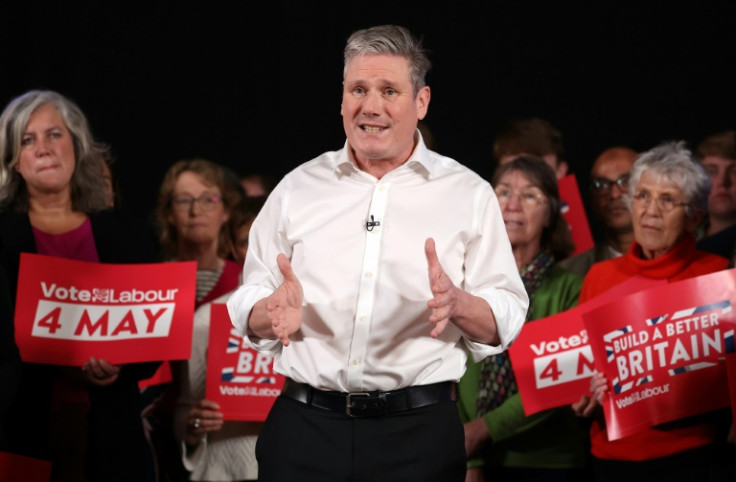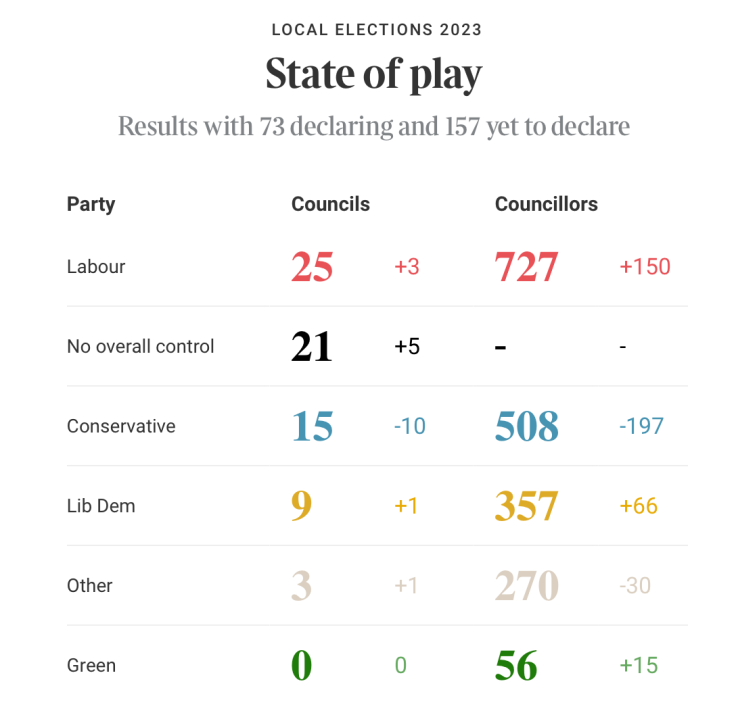Local election results show Labour on course to win majority in general election
Last night's local elections across the UK were billed as a crucial indicator of the next general election, with the Labour Party building a double-digit lead over the Conservatives.

Last night's Local Council Elections across the UK were billed as a crucial indicator of how the Conservatives and Labour will fare in the next General Election.
Recent polling has suggested the opposition Labour Party have built a double-digit lead over the Conservatives, and the municipal elections have been described by the party as a referendum on "13 years of Tory failure".
Surveys indicate that voters are deeply worried about double-digit inflation and the crisis engulfing the state-run National Health Service, as doctors and nurses strike for better pay.
Writing in the Daily Mirror newspaper on Thursday, Labour leader Keir Starmer laid out a charge sheet of failing public services, rising crime and record waiting lists at hospitals.
"Your vote matters," he said. "If you believe it's time to build a better Britain, grab your photo ID, get down to your polling station and vote for Labour today."
Yesterday's election was the first in England to require photo ID - which the Electoral Commission says meant some people were "regrettably unable to vote". It is estimated up to 2.1 million voters were barred from polling stations at yesterday's local elections because they lack approved documents, such as a passport.
The Labour leader has accused the Tories of deterring young voters who were more likely to vote for his party. "The Government bears a heavy responsibility for making sure everybody understands they need ID and to encourage people to get registered for postal votes," said Starmer.
The leader of the opposition added: "Polling shows a number of members of the public don't even know the rules have changed – that's a government failure."
Nonetheless, Prime Minister Rishi Sunak appeared to be bracing himself for a disappointing result, telling a think-tank event on Wednesday that "good councillors will lose their seats because of all that has happened over the past year."
And it appears his prediction has come true.

As the results of the local elections began to filter through today, it has become clear that the Conservatives have suffered a resounding defeat.
Sir Keir Starmer visited Chatham in Kent after a key victory on the Medway council. Addressing councillors and supporters, he said: "You didn't just get it over the line, you blew the doors off. The first victory here since 1998. An amazing, amazing set of results."
The Labour leader said his party was making gains in "all the places that we need to win the battlegrounds." He added: "We are on course for a Labour majority at the next general election."
This optimism has emerged as a result of other key victories for Starmer's Labour, in areas including Stoke-on-Trent and Plymouth. He believes that if the results so far were replicated nationally then the party would enjoy a larger win in a general election next year than Sir Tony Blair's 1997 victory.
However, the results have been played down slightly by other commentators.
Sir John Curtice, a polling expert, said that although it was an "unambiguously bad" night for the Tories, Starmer was still set to be forced to "share the spoils with other opposition parties."
The Lib Dems have seized control of Windsor and Maidenhead, and retained control of Cotswold District Council, after a showing hailed by the party leader Sir Ed Davey as "ground-breaking".
The party, which already had an overall majority on the council after taking control from the Conservatives in 2019, has so far gained four seats, while the Tories lost five and the Greens gained one.
For the Tories, the outlook is bleak. They are on course to lose 1,000 seats, an even worse showing than an already negative set of predictions.
Conservative MP David Davis didn't mince his words when he was asked about the reasons behind his party's significant council losses. "It is clear we're paying the price for the end of the Boris and Liz Truss era," he said at the local election count in Anlaby, East Yorkshire.
The next general election isn't due until January 2025. This represents five years from the day the current Parliament first met (17 December 2019) — plus the time required for an election campaign.
The last general election was held on December 12, 2019, when the Conservative Party won a landslide majority of 80 seats after winning 43.6 per cent of the popular vote — the highest percentage for any party since 1979. The prime minister at the time, Boris Johnson, called the election after months of parliamentary deadlock that delayed Brexit.
Labour will be hoping that today's local election results will serve as a precursor to a general election victory, which would produce the first Labour majority since Blair's 2005 victory.
© Copyright IBTimes 2025. All rights reserved.






















